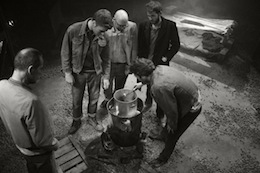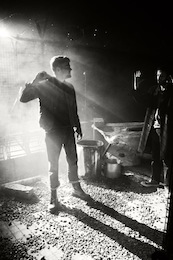Sabine Dargent’s design for Over the Wire has the audience seated in a single row pressed against the four sides of a wire cage. Inside the cage, which is topped with barbed wire, we can see a small yard with rubble, some metal barrels, and a rough shelter of concrete blocks and plastic sheeting; from under the sheeting booted feet protrude from a jumble of human bodies. There is another cage behind this, also full of rubble. For the spectator, the dust and cramped seating give some physical sense of the discomfort of these men, living and sleeping outside in a prison compound.
Seamas Keenan’s play is set in 1974 in Long Kesh, after the burning of the prison by Republican prisoners. In the early 1970s prisoners were housed in Nissen huts inside compounds fenced with wire, and in October 1974 the Republican internees and prisoners burned the huts in protest at prison conditions. The play, however, focuses on the physical and mental stress of five men who live in their burned-out compound, surviving on water and stale bread and occasional smuggled food, and sleeping in a make-shift shelter as the winter  draws in. Although the OC Dee (James Lecky) attempts to maintain discipline and morale, marching the men around the tiny space every morning, the regular violent interruptions by the Army and the men’s constant fear of poisoned or drugged food creates a sense of paranoia. The soldiers, they tell each other, spit and urinate in their food, and they believe that the medication being given to Barry (Martin Bradley) is tainted and makes him more unstable. When Lucas (Pat Lynch) persuades Dee that the other recruits are British agents who plan to kill them, their small society rapidly descends into violence and chaos.
draws in. Although the OC Dee (James Lecky) attempts to maintain discipline and morale, marching the men around the tiny space every morning, the regular violent interruptions by the Army and the men’s constant fear of poisoned or drugged food creates a sense of paranoia. The soldiers, they tell each other, spit and urinate in their food, and they believe that the medication being given to Barry (Martin Bradley) is tainted and makes him more unstable. When Lucas (Pat Lynch) persuades Dee that the other recruits are British agents who plan to kill them, their small society rapidly descends into violence and chaos.
Kenny Glenaan’s direction draws strong performances from the whole cast. In this kind of performance configuration the actors are always visible, and the five remain focused and in character throughout. The scenes of violence and torture are perhaps slightly too fast-paced for the audience to feel the full dread of what they are about to see, but Lynch’s representation of Lucas’s deteriorating mental state is controlled and creates a doubt for the audience: is Lucas really afraid of assassination, or is he himself the informer? As the balance of power in the cage shifts between Dee and Lucas, and the group’s helplessness as prisoners is foregrounded, all the relationships come under stress. The audience is confronted with the ways that the characters’ degradation and dehumanization at the hands of the Army is replicated in their treatment of each other. Although early in the play Barry catches a rat to add to the cooking pot, by the end Dee comments that they never see any animals - they have become the animals.
 The lighting and sound designs work to heighten the sense of tension and stress inside the compound. Sinéad McKenna’s design marks the passage of cold days and nights and creates abrupt and violent interruptions in the form of helicopter search-lights and prison spot-lights. The sound design mixes the everyday sounds that create a sense of the space outside the cage with the sound of heartbeats in moments of particular stress or alienation. Together, sound and lighting work seamlessly with the set to express a sense of dread and distress that is heightened as the action unfolds. And yet in another sense there is no action: nothing really happens. The characters live inside their cage, slowly falling apart, their trust and sympathy with one another steadily wearing away, unable to take any action that will alter their situation.
The lighting and sound designs work to heighten the sense of tension and stress inside the compound. Sinéad McKenna’s design marks the passage of cold days and nights and creates abrupt and violent interruptions in the form of helicopter search-lights and prison spot-lights. The sound design mixes the everyday sounds that create a sense of the space outside the cage with the sound of heartbeats in moments of particular stress or alienation. Together, sound and lighting work seamlessly with the set to express a sense of dread and distress that is heightened as the action unfolds. And yet in another sense there is no action: nothing really happens. The characters live inside their cage, slowly falling apart, their trust and sympathy with one another steadily wearing away, unable to take any action that will alter their situation.
There are some lovely moments, such as Colin (Michéal McDaid) quietly acknowledging that his girlfriend’s baby is not his, and the silent distress and confusion of Dutch (Andrew Doherty) when he is accused of informing. The controlled desperation of Barry and Lucas, and Dee’s helplessness, add to the pathos of a play that looks beyond questions of justification and the rights and wrongs of the Northern Irish conflict, to explore instead the loneliness and despair of the individual, caught in a particular moment of history. Colin wants to marry his girlfriend so that there will be someone there for him when he finishes his twelve-year sentence. Dutch believes, with youthful idealism, that the Republican movement is winning the war and that they will all be out within a year. With our knowledge that a lasting ceasefire was still twenty-four years away, against present moment of rioting in Belfast, his delusion is bitter and pitiful.
Lisa Fitzpatrick lectures in drama at University of Ulster.